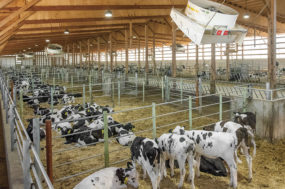Here is a breakdown of the episode:
- Tim, tell me a little bit about what you do in the dairy industry on a day-to-day basis. [1:50]
- You mention that you work as a nutritionist and I was wondering if you could describe in your own words briefly to me what a DCAD diet is? [3:53]
- When it comes to DCAD diets though there are various levels of intensity of DCAD. Can you explain to me what those differences are? [6:50]
- Can you tell me about what the biggest DCAD myths are in your mind when talking about DCAD? [10:22]
- In your mind what is the best way to estimate the acid-base status of a group of cows being fed a negative DCAD diet? [12:45]
- What are some of the risks that happen when urine pH drops below a score of 6? [15:37]
- What negatives should producers be aware of before attempting this and reaching that extreme metabolic acidification? [19:40]
- Can you tell me what you think is the most optimum level of negative DCAD and pH? [28:11]
Are you a subscriber?
Keep up with our Progressive Dairy podcast episodes to gain insights from what is happening in the industry to new and evolving management techniques for your operation. Just like our magazine, we’ll cover a multitude of topics including human resources, business management, facilities, repro and genetics, feed and nutrition, calf and heifer raising, dry and transition cows, herd health, hoof health, milk quality, animal welfare and manure handling. Subscribe now to be notified of new releases.
Click here to find quick links to subscribe on your favorite platform.



